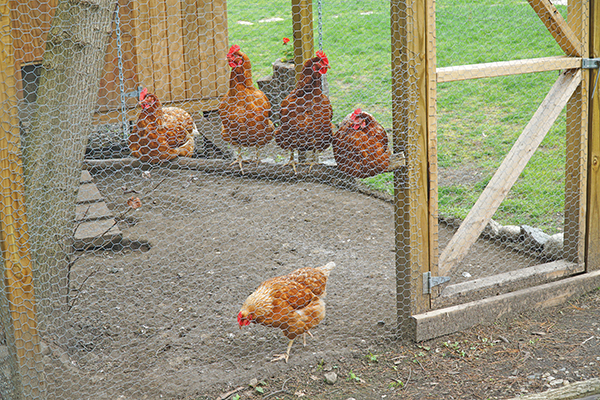 Some municipalities have strict local ordinances, zoning laws and property association rules that limit or prohibit raising chickens. Check with code enforcement officers to see if permits are required.
Some municipalities have strict local ordinances, zoning laws and property association rules that limit or prohibit raising chickens. Check with code enforcement officers to see if permits are required.
Ball suggested that new owners decide whether to raise meat chicks, laying chicks, or both. Different breeds have different temperaments and living space requirements.
An outside space should allow at least six square feet per average-sized bird; the coop should allow two to three square feet per bird.
“Be absolutely sure both the outside area and the coop have no place for predators to climb through or under,” Ball said.
Chickens are prized by hawks, dogs, coyotes, raccoons, skunks, foxes, rats and weasels. Predators climb fences, dig under floorboards and squeeze through tiny knotholes.
A sturdy outside fence with one-inch chicken wire should measure six feet high and be fastened securely to the ground. Sturdy netting over the top adds protection. Be sure to shut chickens in each evening, and regularly check both the inside and outside spaces for any new holes or breaks.
When starting with baby chicks, plan in advance for special care. Disinfect a dry, draft-free area and spread two to three inches of litter, preferably wood shavings. Ball said warmth is critical for these little ones.
A brooder guard, which can be a cardboard box or a circular cardboard fence, confines the chicks near the heat source in a draft-free area. A 250-watt infra-red bulb hung 18 inches from the area provides the extra warmth. Make sure the area provides plenty of space.
“Chicks need to be able to move away from the heat if they’re too warm,” he said.
Turn lamps on the day before chicks arrive to prepare and warm the litter. “The bedding should be warm to the touch,” Ball said.
Happy chicks should form a loose circle under the lamp. They do well with 24 hours of light the first week, but reduce the light to 12 to 13 hours later.
At six weeks, and depending on the weather, move the checks to the coop and use the same litter used in the brooder. Cleanliness is the key to success.
“Water and containers and feed pans or troughs must be kept very clean,” Ball said. “Bacteria can spread quickly and kill a flock with little advance warning.”
Paris Farmers Union locations carry all the building equipment, fencing, feed and nutritional supplements that chickens will need at every stage of their lives. Personnel can also provide plenty of expert information about critical components of a successful start.
Chicks up to eight weeks old should eat a “chick starter” diet, following bag directions.
“Don’t buy more than a month’s supply at a time,” Ball said. “Vitamins deteriorate and won’t help the chicks thrive.”
Change their diet to a growing ration at eight weeks, a maintenance ration at 14 weeks, and a laying ration by 20 weeks.
“Don’t add anything extra,” Ball advised.
Manure removed from coops should be aged in a compost bin, because it’s very potent and can burn plants if applied too soon.
Small-scale farmers shouldn’t expect to save a lot of grocery money by raising a handful of chickens. They will have to buy younger hens to replace the older layers if they need a certain quantity of eggs per day.
“A 1- to 2-year old hen will lay an egg or two a day,” Ball said. “Four years is about the end of their cycle.”
A flock doesn’t need a rooster to produce eggs. Chickens start laying by 20 weeks, and they can be encouraged to go to specific places by placing an egg-shaped or round object in the nest.
Three one-cubic-foot straw-filled nest boxes in a dark corner will serve a dozen hens. Chickens love roosts, but they aren’t necessary.
Paris Farmers Union also offers handbooks with instructions for shelter, food, health care and information about breeds, anatomy, and health. “‘Storey’s Guide to Raising Chickens’ is excellent,” Ball noted.
Owners should learn about vaccinations, illnesses and symptoms. Even though it’s a chance for children to learn about the life cycle of an animal, be prepared for the eventual demise of members of the flock, he added.
Copy the Story LinkSend questions/comments to the editors.



Success. Please wait for the page to reload. If the page does not reload within 5 seconds, please refresh the page.
Enter your email and password to access comments.
Hi, to comment on stories you must . This profile is in addition to your subscription and website login.
Already have a commenting profile? .
Invalid username/password.
Please check your email to confirm and complete your registration.
Only subscribers are eligible to post comments. Please subscribe or login first for digital access. Here’s why.
Use the form below to reset your password. When you've submitted your account email, we will send an email with a reset code.